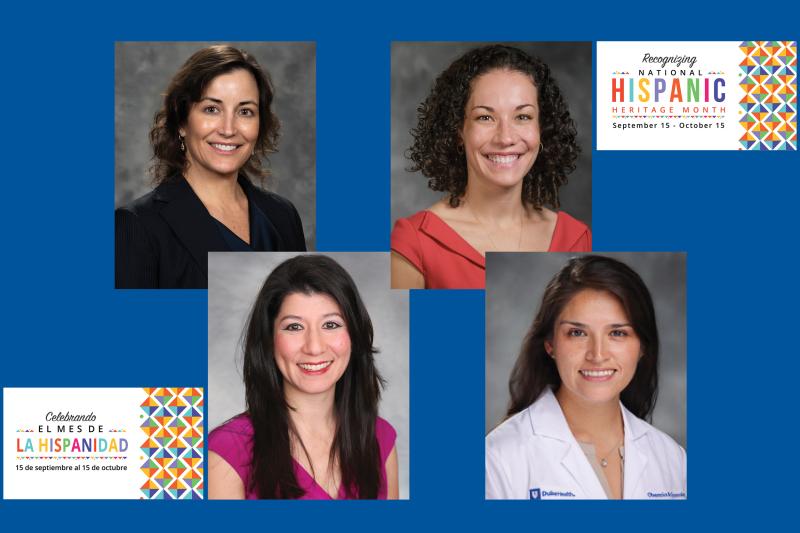
Chair's Guest Message to the Department
Thank you to our guest contributors for sharing their personal sentiments and experiences in this message, and to Director of Inclusion, Diversity and Community Engagement Latoya Patterson, MD, MPH, for assistance with compiling it.
National Hispanic (and Latine) Heritage Month is underway, when we celebrate and honor the contributions of individuals of Caribbean, Mexican, and Central and South American descent. This year's official theme, "Pioneers of Change: Shaping the Future Together," highlights the trailblazing contributions and achievements of our Hispanic/Latine community and how we can continue working collectively toward a brighter future. Currently, individuals of Hispanic descent represent the largest ethnic group in the United States, comprising 19.1% of the total population. Within our own Department of Obstetrics and Gynecology at Duke, we are proud to recognize the impact and contributions of those of Hispanic/Latine heritage. We represent a diverse group from countries such as Mexico and Cuba. About 5% of department members identify as Hispanic/Latine, and here, we share highlights that some have provided:
Angeles Alvarez Secord, MD, MHSc, the first female Hispanic faculty member in the Division of Gynecologic Oncology, exemplifies the spirit of this year's celebration. Reflecting on her journey, she shared, "I grew up with the belief that everything is truly possible. Through education, diligence and relentless optimism, we can all achieve great accomplishments." Her story perfectly embodies this year's additional theme, "Everything is Possible," which underscores the limitless opportunities available when we pursue our goals with perseverance. "I feel so privileged to be a physician and part of a wonderful team dedicated to caring for our patients," she added.
When asked what the terms Hispanic or LatinX mean to them, department members offered personal reflections. Cassandra Kisby, MD, MS, highlighted the diversity of identity labels within the community. She shared, "Some of us call ourselves Hispanic, Latine, LatinX, [country]-American, and some a combination of these. Regardless of the label, what it represents to us is our culture and upbringing. For me, it means family members who converse in Spanglish and get emocionado in Spanish, authentic Mexican food washed down with a margarita, cultural dances and discotecas, and appreciation of your roots and how that made you who you are today."
Amie Kawasaki, MD, reflected on how growing up in Miami, she initially didn't see herself as part of a minority group. "Funny, but I never realized that I was in a minority group until I moved away from my hometown of Miami. Actually, I take that back. I was commonly singled out by my friends and colleagues as being the token 'Asian' person; so, I guess that I was a minority within minorities, so to speak," she noted. "Being Hispanic meant that my childhood was initiated with early morning Cuban coffee in my milk, and a side of heavily buttered and pressed tostada before arriving at my elementary school, Conchita Espinosa Academy. Our cafeteria didn't serve chicken nuggets and pizza; we ate arroz con pollo and ropa vieja for lunch. That's also commonly what I ate for dinner, which was prepared by my Cuban abuela, who lived with us in our multi-generational household. She was pretty respectful of my Japanese father, so we often mixed in white rice dishes as well," she added.
For others, being Hispanic or LatinX means carrying forward the sacrifices and dreams of previous generations. As resident Dayana Hernandez Calderon, MD, shared, "It means breaking barriers and sharing my culture and heritage in new spaces. It also means carrying the strength, hopes and dreams of my parents and grandparents, who faced barriers and made a lot of sacrifices so that I can have more opportunities than they did."
The importance of cultural identity extends beyond personal experiences; it also plays a critical role in how health care providers connect with and care for patients. Dr. Kisby highlighted how her heritage helps bridge gaps in communication and understanding with Hispanic/Latine patients. She explained, "While we all give amazing care to our patients, our patients do appreciate seeing people 'like them' in the health care setting. There are many instances where medical interpretations are very literal and miss the nuances of a patient’s story; knowing more colloquial Spanish has helped in those situations. Furthermore, being Hispanic has helped me provide better care for the whole patient, including their family unit, as patients are integral to this unit and make decisions based on the family's feelings, opinions and resources."
Dr. Kawasaki further emphasized this connection, sharing, "Being Hispanic means that when a patient walks into my office and desperately tries to piece together her sentences in what little English she can muster, I can smile at her and ask, '¿prefieres hablar en Español?' Being Hispanic means getting to share in that moment of relief, surprise and excitement when my patient realizes that she can be cared for using her native language."
Dr. Calderon echoed these sentiments, expressing the fulfillment that comes from caring for patients in their common language. "I love caring for patients from all different backgrounds, but my favorite interactions are those with Spanish-speaking patients. My culture and language allow me to care for them directly without the use of a third party, reducing the likelihood of things being lost in translation," she said. "Given that every culture has different beliefs and practices with regard to illness and healing, my culture helps me understand nuances in patients’ questions, allowing me to provide better education and empower patients in my care. It creates room for patients to share their complex social histories, which has been proven to affect overall health, so I can provide more holistic care. It has allowed me to tailor my care to suit individual patient needs better."
Together, those of Hispanic/Latine heritage contribute to the rich fabric of our department and workforce. We strive to foster an environment of respect, compassion and trust for our diverse patient population, ensuring access to equitable and high quality obstetric and gynecologic care.